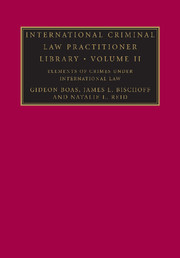Book contents
Foreword
Published online by Cambridge University Press: 10 December 2009
Summary
International criminal law has developed substantially in the past two decades largely due to the creation of the ad hoc Tribunals for the former Yugoslavia and Rwanda and the International Criminal Court. Although much attention has been devoted to the International Criminal Court (ICC) since 1998, on the ground that it is a truly international tribunal, international criminal law has developed mainly through the jurisprudence of the International Criminal Tribunal for the former Yugoslavia (ICTY) and the International Criminal Tribunal for Rwanda (ICTR). Unlike the ICC, which at the time of writing has delivered few judgments, the ad hoc Tribunals have been operating actively as criminal law tribunals for more than a decade. Lengthy, carefully researched, and thoroughly reasoned judgments have been handed down by judges from different countries with different judicial experience. These judgments have created a new international or transnational criminal law that draws on the experience of the Nuremberg and Tokyo Tribunals and national courts, and successfully integrates national and international criminal law, humanitarian law and human rights law.
The ICTY and ICTR have succeeded in developing both procedural law and substantive international criminal law. A host of orders have been given on questions of procedure designed to ensure that due process of law is respected; and many judgments have been rendered on questions of substantive law that advance international criminal justice.
- Type
- Chapter
- Information
- International Criminal Law Practitioner Library , pp. xv - xviiPublisher: Cambridge University PressPrint publication year: 2009



